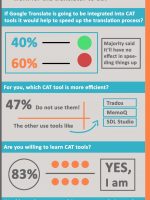Is Google Translate helpful in translations? A Quick Translator Survey

More and more we hear translation companies decide to start using Google Translate in their mix in order to cut down costs and speed up delivery time. Rumors also indicate that some big companies in the technical field, as well as governmental agencies are using machines in order to translate some of their documents in other languages. Just out of curiosity, we were wondering what our translators think about this so we decided to send out a survey to all of them.
Is Google Translate helpful in translations? Let’s find out!

Google Translate Helpful?
It is weird to think that at the beginning of the 19th century, we didn’t have telephones but today we have smartphones. The speed at which technology is progressing has made people fear the rule of Artificial Intelligence over Earth. That might not be a crazy thought but no matter how powerful and advanced technology becomes, it can never replace humans. There are many things in life that will always be a human’s job. From handling everyday tasks to creating complex artistic pieces, expressing their talent in poetry to translating difficult languages, machines can never take over some things. And that’s why Google Translate is not a good option when interpreting important documents.
Don’t want to read all this? See our infographic
You placed an important phrase in Google Translate just to get the meaning. It does not need to be too accurate but the accuracy of the ‘gist’ of meaning is still significant. Should you trust machine translations?
Sadly, no, you should not! The meaning could be affected by moving one word and you wouldn’t know. The accurate translation of idioms and phrases could have specific and decisive meaning and you will not have a clue. The meaning could be completely metaphorical while you are getting a literal translation. You will, again, not know!
If you don’t want to read the whole article, we have prepared an infographic about this, which is a lot easier to understand. Click the image to get a larger one. If you prefer to have a pdf file, you can download our Google Translator survey as a pdf document.

Did you ever used machine translation in your work?
First question we’ve sent to our translators was if they ever used machine translation in their work, namely Google Translate for documents. Surprisingly, 58,66% of the respondents said they have used it in the past. You may have heard before that translators hate technology, we heard that too, so the answer wasn’t exactly what we were expecting. However, it turns out that most of those translators have used automated translation at client’s request.
As you may know, some big companies are using automated translation for some of their documents – when was the last time you bought a product and its manual was translated in a bunch of languages, but the translation in your language wasn’t that great? It was probably translated by a machine, or it was a rush job.
Do you think Google Translate should be used by translation companies?
Things change with this question. Only 21,33% of the respondents were of the opinion that machine translation should be used by translation companies, while 78,77% didn’t agree with that. We’re not going to jump to conclusions with this, so let’s move on to the next question.
If Google Translate will be used, will this affect in any way the quality of the translation?
Looks like using machines to translate is going to affect the quality of the translation according to 83,24% of the translators who responded to this question. Truth is, while on some fields you can have a machine do a certain job and it will do it perfectly and much faster than a human, in other fields a machine may fail to provide the same quality, no matter how much high tech technology and programming you put into that machine. Only 16,76% of the translators responded with no at the above question, so it looks like translation is such a field.
Could it help you by offering during your translation the translated text but more as a support rather than a pre-translation?
We’ve tried to see if machine translation could be useful to our translators by only providing them initial support, for instance, if they encounter some words they don’t know exactly what they mean, or which meaning should be used.
Over 69% of the translators responding to this question agreed that GT can be used at that. In fact, if you’re trying to use it as you’d use a dictionary it may reveal different meanings for a certain word.


How willing are you to offer your services to edit text that is translated by Google Translate?
This one is a little complicated. 28,49% of the translators aren’t willing to use it at all. 13,97% think they can use it in 10% of their activities, 7,82% were willing to use it in 25% of their work, 23,46% want to use it in 50% of their job and 26,26% are willing to use it all the time.
If a translation has been done using Google Translate, are you willing to do the editing/proofreading (considering you have both source and translation at hand)?
Yet another surprise here, over 61% of the translators were willing to edit or proofread machine translation. We were actually expecting less than that as it is more work compared to editing human translation and spotting errors.
If Google Translate is going to be integrated into CAT tools, could that be of help to speed up your translation process?
As you may know already, computer assisted translation tools are just that: tools that help a translator during his work. Machine translation on the other hand is something completely different.
Some 40% of the translators think Google Translate will help in speeding up the translation process, while the vast majority said it’ll have no effect in speeding things up.
From all CAT tools you’ve worked with, which one you think is the most efficient?
As said above, using computer assisted translation tools isn’t new, and there are some good ones out there which really help the translator at keeping consistency of the translation, making sure the right terminology is being used, or coming up with bits of translations that were done before (more on translation memory here). 47% of the translators don’t use any type of CAT tool, while the others are using tools like Trados, MemoQ or SDL Studio to help them with their translations.
In case you don’t know any CAT tools, are you willing to learn them in order to improve your skills?
Just over 83% of the translators are willing to learn how to use CAT tools in order to speed up their work. This is something we are working on, and you can find some great tutorials in our training section of our website.
Would you be willing to do your own QA to your translation and correct errors?
59,78% of the respondents said they already do a final proofreading, and they are willing to correct the errors if the QA report is clear, and it usually is. 40% didn’t agree to do it, mostly because usually delivery time is short and they don’t have the necessary time to detach from their work.


You probably have had sometimes quality issues when you delivered your translation as every translator has once in a while. Do you think the customer comments were fair?
62% of the translators said the comments were fair and they have corrected their work. Here are some comments we found to be interesting:
– Sometimes yes, but there were also times that the original text was of really low quality, hard to give a good translation
– Some of them were fair. But a lot of times the customer feeds the TR with a document that has been poorly machine translated from Chinese, and expects that all will work out nice automagically.
– Some clients complain about vocabulary even though they did not provide the translator with a glossary-which they often have but for some reason don’t want to share.
– Sometimes customers do not know the standards of the target language. In addition, sometimes they use glossaries prepared by people who do not make the corresponding research in the target language and make “literal translations”.
Do you get the feeling that translation agencies think the customer is always right?
Over 59% said translation agencies tend to think the customer is always right. While this could be true in some cases, here at Universal Translation Services we strive to provide a good experience to both clients and translators. In case problems arise, our project managers will quickly reopen the project and work with both clients and translators to make sure both parties are happy.
Conclusion in using Google Translate for documents
While some of the translators are reluctant in using any kind of translation tool (even CAT tools), some of them agreed they could use Google Translate as a tool to learn more about some of the words used in the source file and their possible meanings. This is close to using any online dictionary, except that it gives extra information about word’s meanings and how should be translated.
At this time, human translation can’t be beaten by machine translation, and trying to use Google Translator for documents may lead to an inaccurate translation with unwanted consequences.
So, when should I use it?
When you are getting translations that are thoroughly unimportant. You should find an interpreter and get a mild and passing translation through a phone call but for all the important translations, we advise you to stay away from machine translation.


A great tool, but not to be used for professional translations
Google Translate is a modern tool that is always readily available and free to use. There are numerous reasons why people are using it every day and for various purposes. Is the tool being used by our translators in their work? We have thoroughly enjoyed gathering the data and from what we see, any serious translator will put any machine translation tool in low regard when it comes to professional translations. But we all know that the best feature of the tool is that it is free!
The translator’s perspective
We have come up with a mild conclusive thought for the general audience to consider while they review the translator’s perspective.
A translator is working full time to earn as a profession. Like any other professional in the field, they tend to develop complex opinions about lifelong careers. All the data that we have gathered gives a simple advice to the client:
“Google Translate, although a great tool, should not be used for professional translations…”
A great tool nevertheless
Google’s translator came out with a lot of promise. It is a complicated piece of software that will translate all of the content that you want to be translated into virtually all the languages of the world. And then you took a complicated phrase in English and translated it into your own native language, and then you burst out laughing. Because that phrase had become completely different and was actually very funny to you as a native speaker.
This is the simple virtue and the vice of Google’s translation machine, in a nutshell. It is useful for those who want to get the gist of things.
Here are some comments from translators worth mentioning
– I think Google Translator can be used as a translation tool but correcting a Google translated document should be considered as a translation and not a proofreading
– Would be nice to be able to use a tool to help Google Translate with accurate translation. Have tried without luck
– Google translator can be used as a support but not as a reference, and i think the quality of translation will be way lower if entire document is machine translated
– It’s quite useful for me to have synonyms for words in the target language, so I can choose the appropriate word for the translation
– I prefer to do translations that value quality.
– It would be great to have specialized glossaries and translation memories as reference material as a rule in order to guarantee translation accuracy and quality






